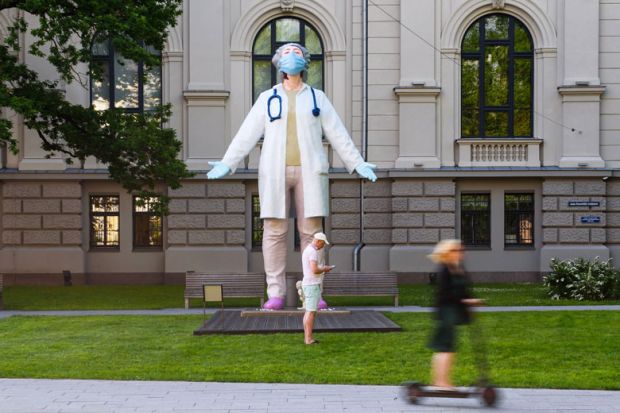Some UK universities have spent just a few hundred pounds per academic for occupational health and well-being over the past six years, with most seeing a downturn in funding during the pandemic, new data suggest.
According to Freedom of Information responses from 80 providers, passed to Times Higher Education, there was a large variation in funding across the sector, from as little as £100 per academic to more than £10,000 at some institutions.
While some differences in spending could be explained by what universities categorise as such expenditure, the large spread in totals was “so dramatic” that it raised major questions, said Nick Pahl, chief executive of the Society of Occupational Medicine (SOM).
He was also concerned by the data showing an apparent downturn in funding in 2020-21, with a 5 per cent drop overall among 71 universities that had comparable figures, and a drop in spending of at least a fifth at 21 institutions.
“Occupational health has been so important over the Covid period in terms of…issues that only occupational health can really deal with. So…the trend doesn’t look great and the variation is of concern,” he said.
Gail Kinman, visiting professor of occupational health psychology at Birkbeck, University of London, said the downturn in funding could be explained by the closure of some on-site facilities during lockdowns or difficulties in spotting staff needs while they worked remotely.
However, Professor Kinman said support was “essential” as academics were entering the new term “depleted and exhausted”.
This support also had to consist of more than secondary and reactive measures such as training in stress-coping techniques.
“What is much harder but what is much more effective are the kinds of primary interventions at an organisational level,” she said, such as ensuring that the workforce was large enough to cope with workloads.
“Even the most mindful and resilient academic is going to be unable to cope with conditions that are actually quite toxic for their well-being.”
Professor Kinman, who has investigated the problem of “sickness presenteeism” in academia – where people continue to work through illness – said failing to take a longer-term view on tackling well-being would risk compounding the problem.
“The big risk is that people feel so exhausted and depleted that absenteeism will be high, presenteeism will be higher and retention will be a problem,” she said. As well as the effect on individuals, this could then be a “serious risk to people’s performance and student satisfaction”.
She added that she would like to see a formal requirement for universities to report their investment in staff health and well-being, with a breakdown of exactly how the money was being spent.
Among the institutions with the lowest spending according to the FoI requests, which were submitted by SOM, was Edinburgh’s Queen Margaret University (QMU), which spent less than £22,000 between 2015-16 and last year, or just over £100 per full-time-equivalent academic.
However, the university said it did spend an extra £92,000 on well-being training for staff that was not included in the figures.
“The health and well-being of our staff is a top priority at QMU, and we’re acutely aware that since the pandemic, this support is more vital than ever,” a spokesman said.
An institution with one of the bigger drops in spending in 2020-21, De Montfort University, said its FoI figures did not include “significant extra budget” devolved to departments while the fall in central budget “was expected” because of provision being delivered online during the Covid lockdown.
Register to continue
Why register?
- Registration is free and only takes a moment
- Once registered, you can read 3 articles a month
- Sign up for our newsletter
Subscribe
Or subscribe for unlimited access to:
- Unlimited access to news, views, insights & reviews
- Digital editions
- Digital access to THE’s university and college rankings analysis
Already registered or a current subscriber? Login








